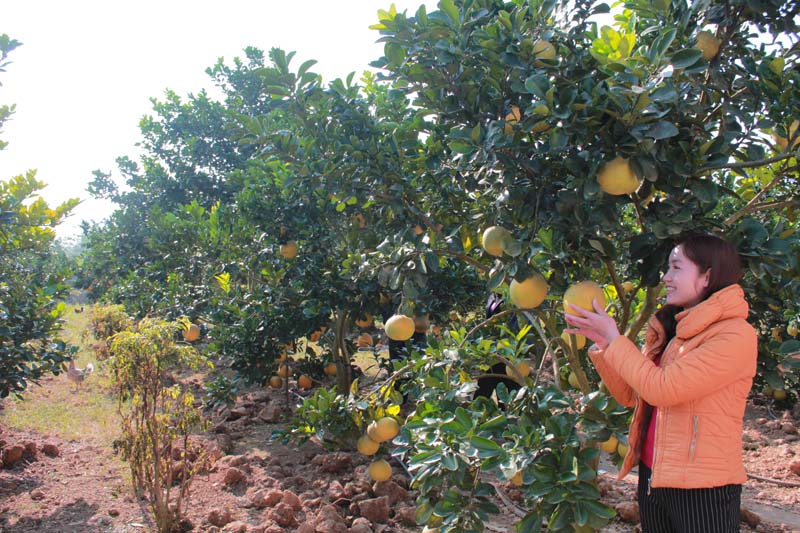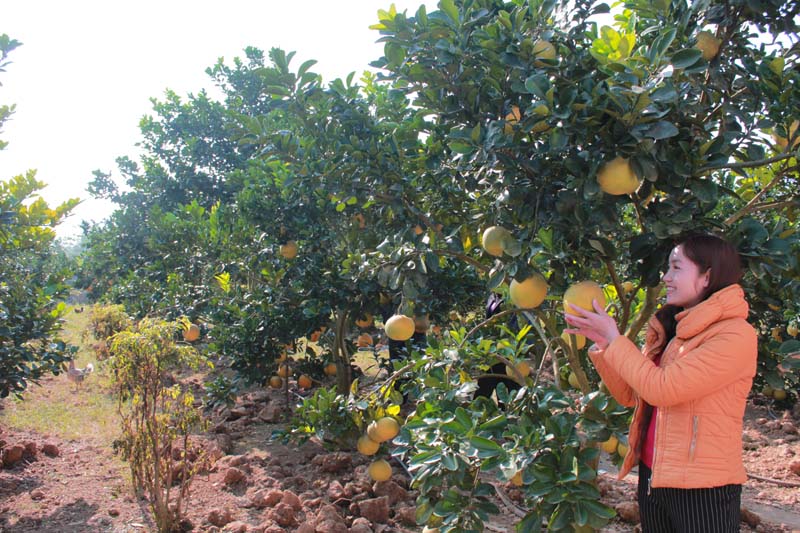
(HBO)- Renovating and changing thinking, getting active participation of the people is the key to successful implementation of the National Target Program to build new rural areas in Doan Ket commune (Yen Thuy).

Dien pomelos are identified as a key crop which
brings high economic efficiency of Doan Ket commune (Yen Thuy).
According to the statistics, in 8 years
(2011-2018), Doan Ket commune has mobilized the total resources of over 100
billion VND to implement the new rural construction program. The commune
mobilizes the resources to renew, upgrade and harden the rural roads.The chairman
of Doan Ket People's Committee, Mr. Bui Van Dau says that to change the face of
the countryside, first of all, it is necessary to develop the production and
increase the income for the people. Therefore, the People's Committee has
issued a Resolution on the economic development, focusing on directing people
to change the structure of plants and animals. They also promote the
application of scientific and technical advances, bring the mechanization into
production and develop household economy in association with economic
cooperation. They pay great attention to promoting the consolidation and
exchanging plots to create a large sample field.
In recent years, the commune has built many
production models with high economic efficiency such as planting taros, green
pumpkins and citrus trees, especially Dien pomelos with an area of 143 ha,
giving an income of 360 million VND / ha. The project of growing stomach
cucumbers of Doan Ket Agricultural Cooperative covers an area of 2.8 ha. Doan
Ket Agricultural Cooperative has signed a chain production contract with Van
Phuc agro-products processing Co., Ltd, earning about 210 million VND/ ha. In
addition, the animal husbandry and the attraction of services are also given
adequate attention to develop the general economy and raise the people’s
income.The commune now maintains the goal of ensuring food safety. The
handicraft and service industries in rural areas continue to be maintained.
Through the implementation of agricultural production programs, the policy to
support production development in the area has contributed to raising income
for people from 13 million VND a person in 2011 to over 29 million VND a person
in 2018. The rate of poor households according to new standards is still over
11%.
According to data from the Hoa Binh Provincial Party Committee, the industrial production index for the first six months of 2025 is estimated to have increased by 20% compared to the same period last year. This marks the highest year-on-year growth rate for this period since 2020.
In the first six months of 2025, Hoa Binh province’s export turnover was estimated at 1.145 billion USD, marking an 18.11% increase compared to the same period in 2024. Import turnover was estimated at $ 804 million, a 17.15% increase, which helped the province maintain a positive trade balance.
The lives of the ethnic minority farmers in Tan Lac district have gradually improved thanks to the new directions in agricultural production. This is a testament to the collective strength fostered through the professional associations and groups implemented by various levels of the district’s Farmers’ Union.
With the motto the "product quality comes first,” after nearly one year of establishment and operation, Muong village’s Clean Food Agricultural and Commercial Cooperative, located in Cau Hamlet, Hung Son Commune (Kim Boi district), has launched reputable, high-quality agricultural products to the market that are well-received by consumers. The products such as Muong village’s pork sausage, salt-cured chicken, and salt-cured pork hocks have gradually carved out a place in the market and they are on the path to obtaining the OCOP certification.
In the past, the phrase "bumper harvest, rock-bottom prices" was a familiar refrain for Vietnamese farmers engaged in fragmented, small-scale agriculture. But today, a new spirit is emerging across rural areas of Hoa Binh province - one of collaboration, organisation, and collective economic models that provide a stable foundation for production.
Maintaining growing area codes and packing facility codes in accordance with regulations is a mandatory requirement for agricultural products to be eligible for export. Recently, the Department of Agriculture and Environment of Hoa Binh province has intensified technical supervision of designated farming areas and packing facilities to safeguard the "green passport" that enables its products to access international markets.



